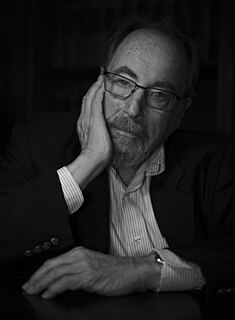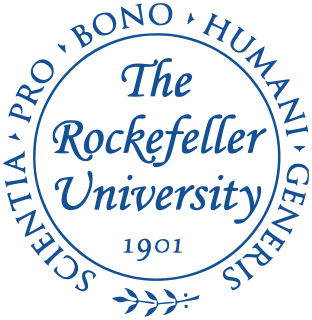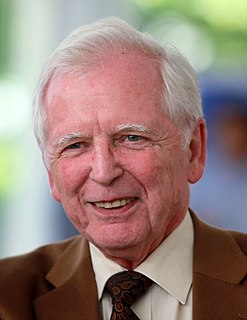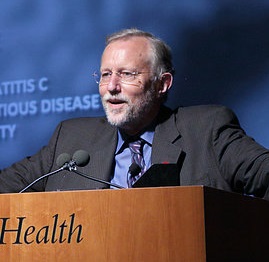
David Baltimore is an American biologist, university administrator, and 1975 Nobel laureate in Physiology or Medicine. He is currently President Emeritus and Distinguished Professor of Biology at the California Institute of Technology (Caltech), where he served as president from 1997 to 2006. He also served as the director of the Joint Center for Translational Medicine, which joined Caltech and UCLA in a program to translate basic scientific discoveries into clinical realities. He also formerly served as president of Rockefeller University from 1990 to 1991, founder and Director of the Whitehead Institute of Biomedical Research from 1982 to 1990, and was president of the American Association for the Advancement of Science in 2007.

The Rockefeller University is a private graduate-only university in New York City. It focuses primarily on the biological and medical sciences and provides doctoral and postdoctoral education. It is classified among "R2: Doctoral Universities – High research activity". Rockefeller is the oldest biomedical research institute in the United States. The 82-person faculty has 37 members of the National Academy of Sciences, 17 members of the National Academy of Medicine, seven Lasker Award recipients, and five Nobel laureates. As of March 2022, a total of 26 Nobel laureates have been affiliated with Rockefeller University.

Paul Berg is an American biochemist and professor emeritus at Stanford University. He was the recipient of the Nobel Prize in Chemistry in 1980, along with Walter Gilbert and Frederick Sanger. The award recognized their contributions to basic research involving nucleic acids. Berg received his undergraduate education at Penn State University, where he majored in biochemistry. He received his Ph.D. in biochemistry from Case Western Reserve University in 1952. Berg worked as a professor at Washington University School of Medicine and Stanford University School of Medicine, in addition to serving as the director of the Beckman Center for Molecular and Genetic Medicine. In addition to the Nobel Prize, Berg was presented with the National Medal of Science in 1983 and the National Library of Medicine Medal in 1986. Berg is a member of the Board of Sponsors for the Bulletin of the Atomic Scientists.

Sir Paul Maxime Nurse is an English geneticist, former President of the Royal Society and Chief Executive and Director of the Francis Crick Institute. He was awarded the 2001 Nobel Prize in Physiology or Medicine along with Leland Hartwell and Tim Hunt for their discoveries of protein molecules that control the division of cells in the cell cycle.

Journal of General Virology is a not-for-profit peer-reviewed scientific journal published by the Microbiology Society. The journal was established in 1967 and covers research into animal viruses, insect viruses, plants viruses, fungal viruses, prokaryotic viruses, and TSE agents. Antiviral compounds and clinical aspects of virus infection are also covered.
Geoffrey Lilley Smith FRS FMedSci FRSB is a British virologist and medical research authority in the area of Vaccinia virus and the family of Poxviruses. Since 1 October 2011 he is Head of the Department of Pathology at the University of Cambridge and a Principal Research Fellow of the Wellcome Trust. Before that, he was Head of the Department of Virology at Imperial College London.

Harald zur Hausen is a German virologist and professor emeritus. He has done research on cancer of the cervix, where he discovered the role of papilloma viruses, for which he received the Nobel Prize in Physiology or Medicine 2008.
Lynn W. Enquist is Professor Emeritus in Molecular Biology at Princeton University, as well as founding editor of the journal Annual Review of Virology. His research focuses on neuroinvasive alpha-herpesviruses.
Sir John James Skehel, is a British virologist and Emeritus scientist at the Francis Crick Institute in London. From 1987 to 2006 he was Director of the National Institute of Medical Research (NIMR) at Mill Hill which was incorporated into the Crick Institute in 2016.
Wolfgang Karl "Bill" Joklik was a virologist and James B. Duke Professor Emeritus of Molecular Genetics and Microbiology at Duke University, from which he retired in 1993 after 25 years chairing the department. In 1981, he founded the American Society for Virology, the first scientific society specifically for virologists, and served a two-year term as its founding president. In the same year, he was elected to the United States National Academy of Sciences. He has been described as "one of the earliest molecular virologists" and is best known for his research on poxviruses and reoviruses, and for work on interferon proteins.

Adrian Clive Hayday FMedSci FRS is the Kay Glendinning professor and Chair in the Department of Immunobiology at King's College London and group leader at the Francis Crick Institute in the UK.
Purnell Whittington Choppin was an American virologist. He served on the faculty of Rockefeller University for nearly thirty years, becoming the Leon Hess Professor of Virology. He moved to the Howard Hughes Medical Institute in 1985, became the president of the institute in 1987, and retired in 1999, succeeded by Thomas Cech. Until his death in 2021, he was the chair of the Scientific Advisory Board at the Center for the Study of Hepatitis C, supported by a university consortium consisting of Rockefeller, Weill Cornell Medical College, and New York-Presbyterian Hospital.

Charles Moen Rice is an American virologist and Nobel Prize laureate whose main area of research is the Hepatitis C virus. He is a professor of virology at the Rockefeller University in New York City and an adjunct professor at Cornell University and Washington University School of Medicine. At the time of the award he was a faculty at Rockefeller.

Edward Charles Holmes is an evolutionary biologist and virologist, and since 2012 a National Health and Medical Research Council (NHMRC) Australia Fellow and professor at the University of Sydney. He is also an Honorary Visiting Professor at Fudan University, Shanghai, China (2019–present)

Professor Jonathan Samuel Friedland is a British physician and medical researcher who is Deputy Principal and Professor of Infectious Diseases at St George's, University of London.
Charles Bangham holds the Chair in Immunology at Imperial College London.

Gao Fu, also known as George Gao Fu, is a Chinese virologist and immunologist. He has served as Director of the Chinese Center for Disease Control and Prevention since 2017 and Dean of the Savaid Medical School of the University of Chinese Academy of Sciences since 2015.

The Wuhan Institute of Virology, Chinese Academy of Sciences is a research institute on virology administered by the Chinese Academy of Sciences (CAS), which reports to the State Council of the People's Republic of China. The institute is one of nine independent organisations in the Wuhan Branch of the CAS. Located in Jiangxia District, Wuhan, Hubei, it opened mainland China's first biosafety level 4 (BSL-4) laboratory. The institute has collaborated with the Galveston National Laboratory in the United States, the Centre International de Recherche en Infectiologie in France, and the National Microbiology Laboratory in Canada. The institute has been an active premier research center for the study of coronaviruses.
Gain-of-function research is medical research that genetically alters an organism in a way that may enhance the biological functions of gene products. This may include an altered pathogenesis, transmissibility, or host range, i.e. the types of hosts that a microorganism can infect. This research is intended to reveal targets to better predict emerging infectious diseases and to develop vaccines and therapeutics. For example, influenza B can only infect humans and harbor seals. Introducing a mutation that would allow influenza B to infect rabbits in a controlled laboratory situation would be considered a gain-of-function experiment, as the virus did not previously have that function. That type of experiment could then help reveal which parts of the virus are responsible for its host range, enabling the creation of antiviral medicines which block this function.
William Paul Duprex is a British scientist and advocate for vaccines and global health. He serves as Director of the University of Pittsburgh's Center for Vaccine Research and Regional Biocontainment Laboratory. Duprex holds the Jonas Salk Chair in Vaccine Research. He is also a professor of microbiology and molecular genetics at the University of Pittsburgh School of Medicine and serves as Editor-in-Chief of the Journal of General Virology, which is published by the Microbiology Society, and a senior editor of mSphere, published by the American Society for Microbiology. Duprex is an expert in measles and mumps viruses and studies viral spillover from animals to humans, including the SARS-CoV-2 virus that caused the COVID-19 pandemic. Duprex is a Fellow of the American Academy of Microbiology.











